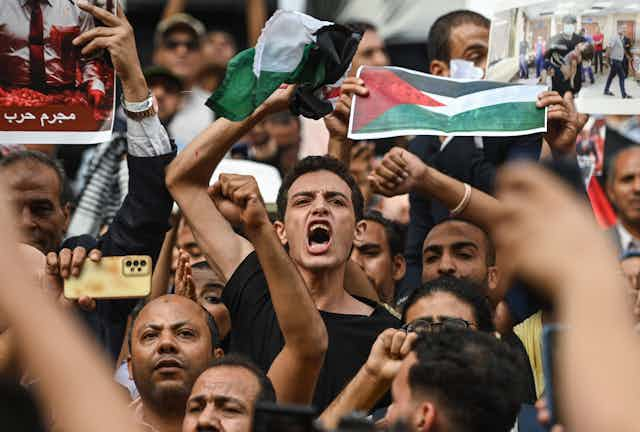Fears are escalating the conflict between Israel and Hamas could spill over into a broader war involving other countries in the region.
Neighbouring countries such as Lebanon, Syria and Egypt, as well as regional players like Iran and Qatar, are currently navigating domestic and international pressures in their response.
So, how likely is it that another country could be dragged into the conflict – or have a diplomatic role in helping resolve the crisis? Here are four possibilities beyond Iran (which we covered in a separate piece).
Read more: Despite its inflammatory rhetoric, Iran is unlikely to attack Israel. Here's why
Egypt: limited desire to get involved
In Egypt, President Abdel Fattah El-Sisi’s regime came to power in 2013 by ousting the Muslim Brotherhood-led government that was democratically elected following the Arab Spring uprising. The Muslim Brotherhood movement has long been a focal point for political opposition in Egypt and is ideologically aligned with Hamas.
Although El-Sisi’s government has allowed some protests against Israel’s actions in Gaza, these have been tightly controlled. And notably, they have not been permitted at Tahrir Square, the heart of the Arab Spring protests.

El-Sisi’s main concern is the conflict in Gaza does not spark widespread demonstrations in Egypt, which could galvanise dissatisfaction with his regime. As such, El-Sisi will try to prioritise domestic stability rather than direct involvement in the war. He will likely support Hamas rhetorically, while doing little of substance to assist its fight against Israel.
Critically, this means Egypt will also remain reluctant to open its southern border crossing with Gaza to allow Palestinian refugees to leave.
For a decade, Egyptian forces have been battling an Islamist insurgency in the Sinai desert. El-Sisi is concerned an influx of refugees from Gaza may exacerbate these tensions and lead to increased militant activity against the regime.
Lebanon: it depends what Hezbollah decides to do
In Lebanon, war with Israel would be an unwelcome development. In recent years Lebanon’s political landscape has been marked by public dissatisfaction with elites and an ongoing economic crisis.
Hezbollah, a powerful Shiite Muslim militant and political group in Lebanon, has already been clashing with Israeli forces across the border. If violence continues to escalate between Israel and Hamas, Hezbollah could enter the war from the north. This would commit Lebanon to an unpopular military confrontation with Israel, shattering the fragile peace between the countries that has held since 2006.
Given Hezbollah is embedded in the Lebanese government and commands the strongest and most well-organised militant force in the country, other Lebanese factions are limited in their ability to restrain it. These factions would also be wary of triggering another civil war by trying to prevent Hezbollah from pursuing military action.
Because Hezbollah receives funding, military equipment and training from Iran, it is seen as one of Tehran’s strongest proxies for its ambitions in the region. Any decision by Hezbollah to increase its attacks on Israel would thus be driven by Iran, or at least carried out with Tehran’s approval.

Syria: backed into a corner by political debts to Iran
Political protest in Syria in 2011 led to civil war between President Bashar al-Assad’s regime and rebel groups. Assad depended on Iranian and Russian military support to maintain his grip on power.
Assad has no incentive to engage Israel militarily and destablise his hard-won political control. However, debts to Iran may need to be repaid with agitation against Israel if Israel launches an expected ground operation into Gaza.
Since Hamas’ October 7 attack on Israeli communities, Syrian state media says Israel has hit airports in Damascus and Aleppo with missile strikes, causing damage and airport closures. State media also said eight Syrian soldiers were killed in an air strike last week. Israel said it had struck Syrian army infrastructure in response to rocket launches from Syria.
Israel’s likely objective with these strikes was to deter, rather than provoke, a military confrontation. The strikes are a reminder to Assad that Israel has the capability to hit important targets deep in Syrian territory – and is willing to do so.
There is a risk such actions, combined with political pressure from Iran and Hezbollah, may still lead to a military escalation between Syria and Israel.
One actor with the ability to restrain Syria is Russia, which maintains a large military presence in the country. Russia has no interest in seeing Syria enter into a war with Israel, as this would likely fracture the fragile political stability Russia has been heavily invested in maintaining.
Qatar: seizing a diplomatic opportunity?
Qatar is perhaps one of the most interesting countries to watch in the coming weeks. For decades, it has played a somewhat provocative and outsized role in regional politics and diplomacy.
Qatar has long had a close relationship with the Muslim Brotherhood and its affiliates. It also houses Hamas’ political offices in Doha and has been one of the key financial backers for the group. As a Sunni Muslim state, Qatar is ideologically more closely aligned with Hamas than the group’s more prominent financial backer, Iran.
Qatar has already played a key role in negotiations with Hamas to release four hostages from Gaza.

Qatar lost regional influence in 2017 when four countries in the region cut ties and imposed a blockade on it. It now wants to regain prominence as a key player in the region. It would be in Qatar’s interests to position itself as a central diplomatic broker in the conflict and avoid being viewed in a similar light to Iran, as an enabler and funder of Hamas activity.
So, could Qatar succeed in leveraging its close relationship with Hamas to facilitate negotiations between the group and Israel to release the remaining Israeli hostages or even bring an end to the conflict? Or would Qatar’s lack of diplomatic relations with Israel thwart these ambitions?
Qatar’s influence may depend on Israel’s appetite for negotiations and the extent to which the United States demonstrates a willingness to broker between the parties.

